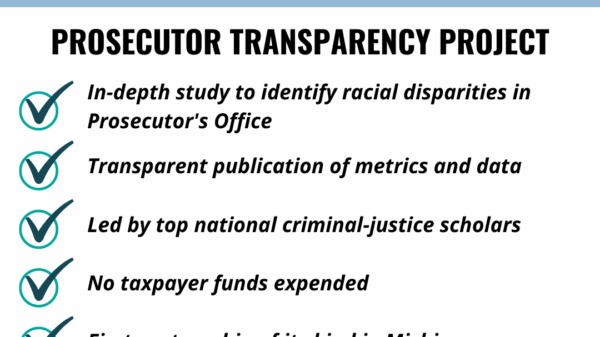Eli Savit didn’t waste any time getting to work fulfilling promises made in his successful campaign to become Washtenaw County’s prosecutor. In the process, despite just taking office January 1, he’s already begun setting a standard that local prosecutors across the state should follow.
On his first day in office, Mr. Savit rescinded “zero-tolerance” policies that, as explained on the Washtenaw County website, "require anyone who engages in certain conduct to face inflexible sanctions, regardless of the factual circumstances. Those policies have been shown to exacerbate racial and socioeconomic inequity. The data shows that they are ineffective. And they can prohibit Assistant Prosecutors from resolving a case in a manner that promotes rehabilitation and restoration. One-size-fits-all justice, simply put, is not justice at all.”
Within days of issuing the directive ending zero-tolerance, Mr. Savit also announced that his office was abolishing the use of cash bail. Cash bail was supposed to be an incentive to get a person charged with a crime to return to court for their trial. But it has morphed into mass incarceration of the poor and people of color. If you can’t pay bail, you remain locked in jail until your case goes to trial. Along with Mr. Savit, the ACLU of Michigan also opposes this practice.
“Cash bail is inherently inequitable and unjust. The size of a person’s bank account should never determine their freedom,” Mr. Savit said in a statement.
Mr. Savit also agreed to partner with us and the University of Michigan on an innovative project designed to shine a light on systemic racism in the office he now leads.
The “Prosecutor Transparency Project” will attempt to uncover potential racial inequities by collecting and analyzing data regarding decisions made by prosecutors. The nature of those choices reflects the vast power placed in the hands of prosecutors, including deciding who is charged with a crime, the nature of the charge, the penalties sought, and other crucial information such as plea-bargaining conduct.
“I’m thrilled to have this incredible partnership in place to drill down into the data in an effort to identify and eliminate racial inequities in the Prosecutor’s Office,” Mr. Savit said when announcing the project. “We know systemic racism exists in all facets of society, and the Prosecutor’s Office is no exception. This partnership will go a long way towards helping inform how we make decisions, and ensuring that justice is dispensed in an unbiased manner moving forward. With nationally renowned experts leading our work, Washtenaw County residents will have confidence that our prosecutor’s office is treating everyone fairly and evenhandedly.”
The starting point will be an audit conducted by independent researchers at the University of Michigan, and funded by the ACLU and Oregon-based Vital Projects Fund, in addition to U-M. The results of the project—the first of its kind to be conducted in Michigan—will be shared with the public. Two other prosecutors – Carol Siemon in Ingham County and Oakland County’s Karen McDonald – also agreed to be part of the Prosecutor Transparency Project.
Part of a new wave of progressive prosecutors who have been winning elections in jurisdictions across the country over the past several years, Mr. Savit promised during the campaign that he would work to identify and eradicate racially disparate conduct in the county’s criminal legal system by partnering with independent, third-party researchers.
The need for such action was highlighted in an August report released by the group Citizens for Racial Equity in Washtenaw. The report suggested that Black residents in the county were much more likely than white residents to be charged with criminal offenses. The announcement of the project fulfils a recommendation by CREW to study racially disparate treatment in depth.
Washtenaw is not alone.
Early last year the Michigan Joint Task Force on Jail and Pretrial Incarceration released a report showing that, based on data from a diverse sample of 20 county jails, Black men made up 6 percent of the resident population of the counties studied but accounted for 29 percent of all jail admissions.
That sort of shocking disparity is why the ACLU, in 2017, launched its Campaign for Smart Justice, an unprecedented, multiyear effort to reduce the U.S. jail and prison population by 50 percent and to combat racial disparities in the criminal legal system. Educating the public about the vast power prosecutors have to shape the criminal legal system, and holding prosecutors accountable are key components of that campaign.
But it is a multipronged effort that also includes working to make deep structural changes that will improve the lives of countless Michiganders. A major step in that direction was taken just last week when, after years of work by the ACLU of Michigan and our many partners, Governor Gretchen Whitmer signed into law a package of bipartisan reform legislation that will greatly reduce the number of people spending time in jail for minor offenses such as driving without a valid license.
But the work is far from over.
In terms of priorities, we and others across the state are setting our sights on dismantling Michigan’s cash bail system. Thanks to the actions taken by Mr. Savit, Washtenaw County will be in a position to show the rest of the state how a system without cash bail can work.
“To be clear, our policy still allows for the detention of people who pose an imminent threat to the community,” Mr. Savit explained. Our office will never consent to pretrial release unless we are satisfied that conditions are in place to ensure public safety. But we will no longer perpetuate a system of wealth-based detention.”
It is a move other prosecutors across Michigan should follow. It is especially important that recently elected prosecutors, such as Ms. McDonald in Oakland County, who ran pledging to pursue reform, live up to those promises.
But ending cash bail can’t just be done on a piecemeal basis. It is too important an issue to only leave in the hands of prosecutors, many of whom still adhere to outdated tough-on-crime, incarceration-driven policies that have proven to be a failure. To that end, we and others will be working with the Michigan Legislature in the coming months to change the system throughout all of Michigan.



